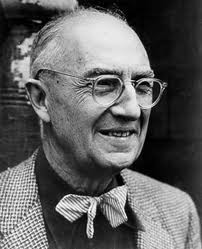
“Life is valuable – when completed by the imagination. And then only.” – William Carlos Williams. The failure of imagination, by which we mean the failure to invite it in, celebrate it, listen closely to its urgings and provocations might be easiest to locate this past week in the historical revisionism over Nixon's resignation 40 years ago, in the nostalgia for collective grief, as if grief were the only lesson available from the resignation of Tricky Dick, not joy, say, or schadenfreuede or a good, healthy dose of I-told-you-so-ism. My own sense of remove from the organized funeral march of the status quo makes me a happy outlier, I think they call it, instead of just a liar, like RN. Nixon was a crook. He was a liar. It makes me happy just to point that out. One of my newest if dumbest conclusions is that one reason poetry is not more esteemed, talked about, celebrated, why people don't, sadly, carry small volumes around with them to the doctor's office or farmers' market or workplace is that it is political (“political”), and not really all that difficult or obscure or hard to understand, not any more or less than is, say, the Nixon story, wrapped and re-wrapped so many times around the arthritic finger of Received Wisdom as to make it impossible to point at anybody.
]
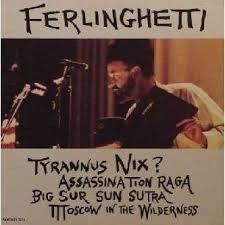
Yes, many ways to celebrate this week. My own favorites, below, book recommendation-wise. But I pulled this ancient, wonderful long-playing record (!) out of the library of audio archives during last week's anniversary Nixon-palooza and listened, loud, to the long epic poem by Lawrence Ferlinghetti (side 1) “Tyrannus Nix?” while read along in my New Directions Paperbook edition (original price $1.25, second printing), purchased with the encouragement of my old biblio-pal Wayne Clayton. We have our fun here at Casa de Bib. By the way, friends ,I do only a few passable celebrity impressions, among them Ferlinghetti (nobody gets it), Brit actor James Mason, Ronnie Ray-Gun hisself and folk singer Arlo Guthrie. I know, obscure, if also totally self-revealing by way of my own weird taste, autobiography and confused, erratic, eclectic reading CV. I think I may have cornered that particular talent-entertainment market-niche, friends, and if there is a through-line beyond just me, do please feel free to explain, preferably over beer.
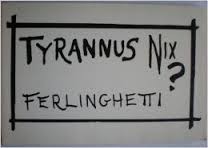
Here, then, a few favorite lines from this long book-length (92 hand-written pages) poem, a funny, smart, dizzyingly exuberant attack-sutra on The Tricky One, including quotes from R.N. himself, and notes, poetic and historical references, baseball imagery, corn-pone American idiom and slang, a perfect document both capturing the man and his moment, and a living document, exactly the kind of thing you'd want to include in a high school history class to go along with (by not going along!) all of the too-easy documentary stuff, such as misreporting and underwhelming.
Nixon Nixon I saw your childhood home on TV I saw your childhood face It was the same face the face of adult America the face we chose for America the space-race face the race face the face that sunk a thousand sampans the face we all love in the Geritol ads the face of the nation facing the nation on color TV the electronic burner that replaced the log fire the electric log the gas log in color with antenna up the chimney We sit entranced by the burning images on the grid in the bright grate the flickering faces in the crucible whose light-intensity we can turn up to suit whose vertical image we can adjust so that the lower half of your face matches the upper half of your face What a groovy invention Just what we need old Blunderbuss Face old Circuit Preacher face American Gothic Bold Face with italic lips on the teleprinter…
Gosh, this makes Nixon kinda fun. You get the idea, and a great, idiomatic American smart-ass populist anarchist romp it is, but also “serious literature.” And about the news, and about poetry, which here delivers it, to call upon Dr. Williams again.

All of that to explain, tediously, that this reader of poetry has, as a result of stumbling upon Ferlinghetti, always imagined that all poetry was political (as in liberationist), besides being useful, fun, necessary, language-intoxicating and so on. That makes me a particular kind of weird poetry reader, maybe not all that sophisticated but at least I have a way in, and easily. So, yes, favorite poets: Whitman, Ginzo, Thomas McGrath, Adrienne Rich, Sharon Olds, Tony Hoagland, Campbell McGrath (no relation), Chilean genius Nicanor Parra, like that, abbreviatedly. Which is why I was so proud of myself for noticing (not that it took much) that two of the “younger poets” I was so lucky to hear at the Community of Writers at Squaw Valley this summer turned out to be so up-front, crazy, genius “political,” beyond being smart and accomplished and nice people, too. Gosh, poetry makes it so easy to be dumb about poetry, and then to get smart, quick. I had not even heard of (!) these two, Matthew Zapruder and Don Mee Choi but, sitting there at their readings, a real treat, I became an immediate hard-core fan, buying their books, which is maybe what we should all, always, be doing (at Powell's please, not Amazon just now).

In her first collection, The Morning News is Exciting, Choi's writing is all about displacement, irreparable and broken versions of stories, which she has put together – rewritten – with the authority and voice of a translator. And listening, responding to the Official Voice, the fake news voice. She is a translator, of contemporary Korean poets, as it happens. But her own life story, of a daughter whose father was a war photographer, of a teacher to second-language community college students and as a kind of re-interpreter of the word puzzle of ideas and fragments and narratives finds its way to a whole new story in the assumptions and authority of voice and fragment, as if everybody knows the actual story, of empire and imperialism and lost people and the too-frequently unvoiced revisionist history of all of the above. And place, too, Seoul and its bastard political geography-culture of Americanist influence, of the homeland and the new land, USA, USA, USA. Guantanamo prison camp, where she ends a poem about the “asymmetrical warfare' of suicide, is the perfect, mean, cruel and humane end of it. To say this work is ironic is to say that people die for irony and what is found there, by there, near there. In “A Journey from Neocolony to Colony,” we find a Choi doppelganger whose alternative reality existence seems to play on the timelessness of empire, even as the poet herself, a narrator tells the story of the other girl, herself sort of, left behind. The reassuring and frankly beautiful tether on which the reader is kept through these difficult, gorgeous poems involves their connecting, vigorously, to theory, including Derrida and Freud and Marx, and the authority of the poet, who is a kind of guide, a political (!) docent of sorts, leading us through a real, imagined, speculative world. Here's a section from the faux naif perspective of narrator-character, in a kind of loud, perfect pidgen universal language of resistance, a logic of infinite empathy.
I have written LETTERS. I sat in my care and cried for a long time. Then I lasted out. I decided to write a long letter. When nothing happens I cannot repress my rage. Far nation calls you and you go. You run with a camera. Far nation pays you to run. Hence morning news in exciting. Far nation pays the petite nation to run. Naturally you run and follow the bomber.. You sit behind the electronic warfare officer and puke. Manage your fear, far narration is here.
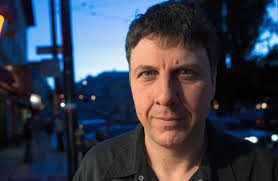
Matthew Zapruder's newest is Sun Bear, and I am guessing is maybe what they call “a great introduction to his work,” which is short poems, syntactically interwoven lines which demand, require, insist on rereading in their rich construction. But as I am only just introduced to this writer's work, I'll critique less and share more, as this is another contemporary poet about whom I want to be smart and expert, and look forward to listening to, reading. First, the title critter, a totem-creature to MZ, is of course threatened or vulnerable or near-extinct or
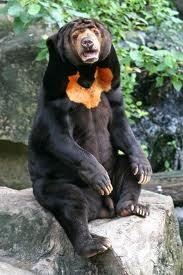
otherwise victim of predatory human behavior. He's in a cage in a zoo in Oakland, California, which is of course perfect for one's “spirit-animal,” and becomes the reasonably panicked circular thinking of the also-doomed humans. Read this aloud, from “Sun Bear,” and see, hear, how the clauses drift into one another with the ease and demand and frustrating perfection of trying to watch water run along in a brook.
we are right nothing
can replace animal love
not even complicated human love
we sometimes choose to allow
ourselves to be chosen by
despite what everyone knows
the problem is
in order to love anything
but an animal you cannot allow
yourself to believe in those things
that are if we don't stop them
going to destroy us
You can see why I thought of Dr. Williams here, with his plums and his asphodels. But things get gratifyingly surreal, as in the poem “Your Eyes are the Color of a Lightbulb Floating in the Potomac River,” a kind of populist confession of ignorance made into a religious confession, a plea for mercy and love and responsibility, the “universe in a grain of sand” insight that comes from just waking up in the morning with your brain on straight, when you are able to see it all, so clearly. It's a poem with answers, and more questions, well asked:
I wonder if my fear this morning sitting in the dark
and listening to music is anything like
the inventor of the telephone growing deaf
and knowing all those poles and wires
were starting to cover the land and somebody everyone
would be able to get exactly what they want
Again, the crazy, melded run-on gliding syntax, forcing us into eternity, and at the same time the consequential politics, politics, reason, history and consequence. Gorgeous and complex and visual, imagistic in its way, maybe like one of WC Williams' disciples, Elizabeth Bishop, too?
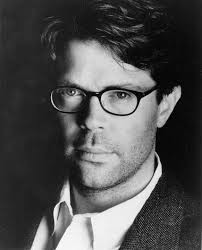
No shyness at all from me here, not one bit of timidity, about weighing in authoritatively (!) about Jonathan Franzen, a favorite author of fiction and nonfiction, and a handsome fella, too. And, lucky, Orange County and OC Bookly readers, I got a nice email from Janis Dinwiddie at the Newport Beach Public Library Foundation about a special kick-off appearance by America's favorite novelist (maybe), on Saturday, October 25, for a wine reception, lecture and book signing, with dessert too. Fifty bucks but it's a benefit, folks, for a great outfit, part of the Witte Lectures series, at a terrific locale. Check out the NBPL Foundation website for information and ticket purchase. Franzen, author most recently of The Corrections and Freedom, is offering a talk titled, “Storytelling and the Modern World,” which sounds both broad and provocative enough to delight anybody who pays attention to either storytelling or what passes for the modern world. See you there.
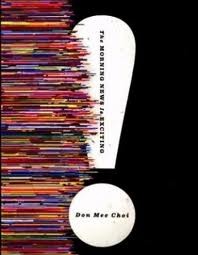
Sun Bear, Mathew Zapruder Copper Canyon Press, 112 pgs., $ 17.00
The Morning News is Exciting, Don Mee Choi Action Books, 120 pgs., $16.00
Andrew Tonkovich edits the West Coast literary journal Santa Monica Review, and returns in spring 2015 to hosting the weekly books show Bibliocracy Radio on KPFK 90.7 FM in Southern California.

